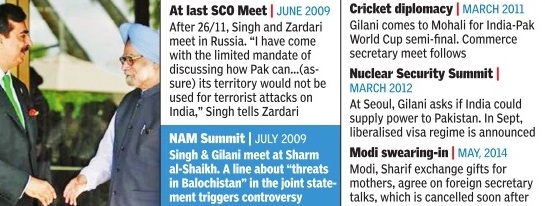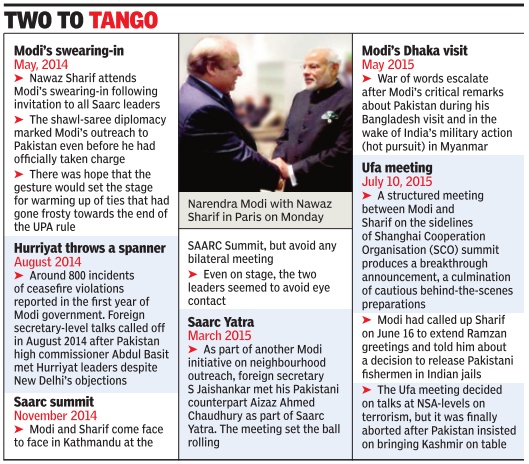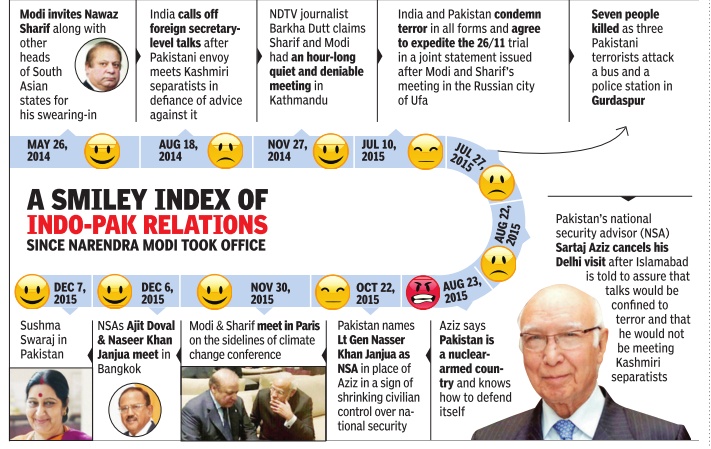Pakistan- India relations
(Created page with "[[File: Indo-Pak talks1.jpg| Indo-Pakistan talks, July 2001-August 2008; Graphic courtesy: [http://epaperbeta.timesofindia.com/Gallery.aspx?id=11_07_2015_015_005_002&type=P&ar...") |
|||
| Line 146: | Line 146: | ||
"National achievements, especially the crushing victory over Pakistan in December 1971 and the apparent ability to create a nuclear weapon, have tended to buoy self-confidence, but euphoria is transient and the feelings of national inferiority are deeply imbedded," the document says. | "National achievements, especially the crushing victory over Pakistan in December 1971 and the apparent ability to create a nuclear weapon, have tended to buoy self-confidence, but euphoria is transient and the feelings of national inferiority are deeply imbedded," the document says. | ||
| + | |||
| + | =Nuclear arms= | ||
| + | ==2001: Musharraf mulled use of nuclear weapons against India== | ||
| + | |||
| + | [http://epaperbeta.timesofindia.com/Article.aspx?eid=31808&articlexml=Mush-mulled-using-nukes-against-India-28072017022020 Dubai|`Mush mulled using nukes against India'|Jul 28 2017 : The Times of India (Delhi)] | ||
| + | |||
| + | Pakistan's former military dictator General Pervez Musharraf has said that he mulled the use of nuclear weapons against India amid tensions following the 2001 terror attack on the Indian Parliament, but decided against doing so out of fear of retaliation, according to a media report. | ||
| + | |||
| + | Musharraf, 73, also recalled that he had many sleepless nights, asking himself whether he would or could deploy nuclear weapons, the Japanese daily `Mainichi Shimbun' said. | ||
| + | |||
| + | When tensions were high in 2001, there was a “danger when (the) nuclear threshold could have been crossed,“ the paper quoted Musharraf as saying. At the time, Musharraf had publicly said that he would not rule out the possibility of using nuclear weapons. | ||
| + | |||
| + | Musharraf also said, however, that at the time, neither India nor Pakistan had nuclear warheads on their missiles, so it would have taken one to two days to make them launch-ready . Asked whether he had ordered that missiles be equipped with nuclear warheads and put into firing position, he said, “We didn't do that and we don't think India also did that, thank God“ pointing, perhaps, to a fear of retaliation, the paper reported. | ||
| + | |||
| + | The two countries subsequently avoided an all-out clash and tensions subsided. The then army chief Musharraf ousted the then PM Nawaz Sharif in a coup in October 1999. The army general served as president from 2001 to 2008. Musharraf has been living in Dubai since last year when he was allowed to leave Pakistan on pretext of medical treatment. He has been charged with involvement in the murder of the former PM Benazir Bhutto in 2007. | ||
Revision as of 15:25, 13 September 2017





This is a collection of articles archived for the excellence of their content. |
Contents |
A timeline: August 1947-September 2016
Key events in India-Pakistan relations: A timeline, August 12, 2017: The Times of India
August 1947
Britain ends its colonial rule over the Indian subcontinent, which becomes two independent nations - Hindu-majority, but secularly governed India and the Islamic republic of Pakistan. The division, widely known as Partition, sparks massive rioting that kills up to 10 lakh, while another 1.5 crore people flee their homes in one of the world's largest human migrations.
October 1947
The two young nations begin a war over control of Kashmir, a Muslim-majority kingdom ruled by a Hindu maharaja. A UN-brokered cease-fire ends the war in a year with Kashmir divided between them.
January 1949
India and Pakistan agree to a UN Security Council resolution calling for a referendum in which Kashmiris would determine their future; the vote never takes place.
September 1960
India and Pakistan sign a World Bank-brokered Indus Water Treaty governing six rivers, or three rivers each. It is the only India-Pakistan treaty that has held.
August 1965
A second war begins over Kashmir, ending a month later in another UN-mandated ceasefire.
December 1971
A third war is fought, this time as India supports secessionists in East Pakistan. The war ends with the creation of Bangladesh.
July 1972
The countries' prime ministers sign an accord for the return of tens of thousands of Pakistani prisoners of war.
May 1974
India conducts a nuclear test, becoming the first nation to do so that's not a permanent UN Security Council member.
December 1989
Armed resistance to Indian rule in Kashmir begins. India accuses Pakistan of giving weapons and training to the fighters. Pakistan says it offers only "moral and diplomatic" support.
May 1998
India detonates five nuclear devices in tests. Pakistan detonates six. Both are slapped with international sanctions.
February 1999
Indian Prime Minister Atal Bihari Vajpayee rides a bus to the Pakistani city of Lahore to meet with Pakistan counterpart, Nawaz Sharif, and sign a major peace accord.
May 1999
Conflict erupts in Kargil as Pakistani forces and Kashmiri fighters occupy Himalayan peaks. India launches air and ground strikes. The US brokers peace.
May 2001
Vajpayee and Pakistan's President Pervez Musharraf meet in the Indian city of Agra, but reach no agreements.
October 2001
Insurgents attack the legislature building in Kashmir, killing 38 people.
December 2001
Gunmen attack India's Parliament, killing 14. India blames militant groups Lashkar-e-Taiba and Jaish-e-Muhammad, and deploys troops to its western frontier with Pakistan. The standoff ends in October 2002 after international mediation.
January 2004
Musharraf and Vajpayee hold talks, launching bilateral negotiations to settle outstanding issues.
February 2007
A train service between India and Pakistan, the Samjhauta Express, is bombed in northern India, killing 68.
October 2008
India and Pakistan open a trade route across Kashmir for the first time in six decades.
November 2008
Gunmen attack Mumbai, killing 166 people. India blames Pakistan-based terror group Lashkar-e-Taiba.
May 2014
India's new Prime Minister Narendra Modi invites Pakistani counterpart Nawaz Sharif to New Delhi for his inauguration.
December 2015
PM Modi makes a surprise visit to the Pakistani city of Lahore on Sharif's birthday and the wedding of his granddaughter.
January 2016
Six gunmen attack an Indian air force base in the northern town of Pathankot, killing seven soldiers in a battle that lasted nearly four days.
July 2016
Indian soldiers kill Kashmiri terrorist and Hizbul Mujahideen leader Burhan Wani, sparking months of anti-India protests and deadly clashes in the region.
September 2016
Suspected terrorists sneak into an Indian army base in Kashmir's Uri and kill 18 soldiers. Four attackers are also killed. 11 days later, Indian Army said it has carried out "surgical strikes" to destroy terror launch pads across the Line of Control in Pakistan.
1972: Pakistan's pro-West tilt 'stemmed from fear of India'
HIGHLIGHTS
India was very concerned about Pakistan's closeness with China even 34 year ago, newly released declassified CIA documents say
Meanwhile, Pakistan was concerned 'India and the Soviets will cooperate to impose their demands on Pakistan'.
Pakistan's pro-US tilt is the direct result of its "fear of India," says one of the thousands of documents the Central Intelligence Agency (CIA) released earlier this month.
"Pakistan's pro-Western orientation stems from her fear of India and USSR rather than any basic sympathy with capitalism or Christian civilisation. It is more negative than positive," an undated CIA document says. It adds that Pakistan at the time wasn't particularly pleased with the US.
"Pakistan is likely to continue basically pro-Western, despite annoyance at the US part in the UN handling of Kashmir and at the US position on North Africa in the UN", the document says.
A 1983 document also talks of Pakistan's obsession with India.
"Pakistan believes India has never accepted its independent existence and it wants to make it a weak buffer state under Indian hegemony. Islamabad is particularly concerned that India and the Soviets will cooperate to impose their demands on Pakistan," says the document from September 1983. That same document talks of India's concerns about Pakistan-China closeness, US military assistance to Pakistan and interference in peace over the Indian Ocean - all concerns that hold good to this day, a whole 34 years later.
"India views Pakistan's strong ties with China with alarm and charges that Pakistan is using the Afghanistan crisis to strengthen itself against India. It opposes US weapons assistance to Pakistan and wants to maintain the Indian ocean area free of superpower rivalry," the 1983 document says.
As for India, a 1972 CIA document says the intelligence agency believed that Indians had a very real sense of "inferiority". "In order to offset the fear that they really may be inferior, however, Indians are often so defensive - touchy and sensitive - that they appear to be offensive, that is assertive, vain, and arrogant," says the document. It then talks of India's "crushing victory over Pakistan" in the December 1971 war.
"National achievements, especially the crushing victory over Pakistan in December 1971 and the apparent ability to create a nuclear weapon, have tended to buoy self-confidence, but euphoria is transient and the feelings of national inferiority are deeply imbedded," the document says.
Nuclear arms
2001: Musharraf mulled use of nuclear weapons against India
Dubai|`Mush mulled using nukes against India'|Jul 28 2017 : The Times of India (Delhi)
Pakistan's former military dictator General Pervez Musharraf has said that he mulled the use of nuclear weapons against India amid tensions following the 2001 terror attack on the Indian Parliament, but decided against doing so out of fear of retaliation, according to a media report.
Musharraf, 73, also recalled that he had many sleepless nights, asking himself whether he would or could deploy nuclear weapons, the Japanese daily `Mainichi Shimbun' said.
When tensions were high in 2001, there was a “danger when (the) nuclear threshold could have been crossed,“ the paper quoted Musharraf as saying. At the time, Musharraf had publicly said that he would not rule out the possibility of using nuclear weapons.
Musharraf also said, however, that at the time, neither India nor Pakistan had nuclear warheads on their missiles, so it would have taken one to two days to make them launch-ready . Asked whether he had ordered that missiles be equipped with nuclear warheads and put into firing position, he said, “We didn't do that and we don't think India also did that, thank God“ pointing, perhaps, to a fear of retaliation, the paper reported.
The two countries subsequently avoided an all-out clash and tensions subsided. The then army chief Musharraf ousted the then PM Nawaz Sharif in a coup in October 1999. The army general served as president from 2001 to 2008. Musharraf has been living in Dubai since last year when he was allowed to leave Pakistan on pretext of medical treatment. He has been charged with involvement in the murder of the former PM Benazir Bhutto in 2007.